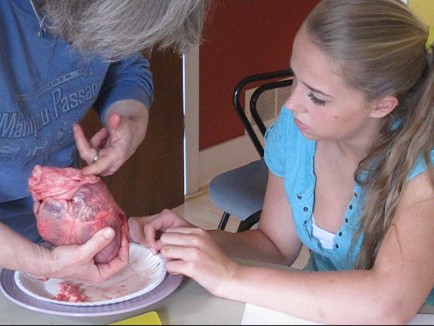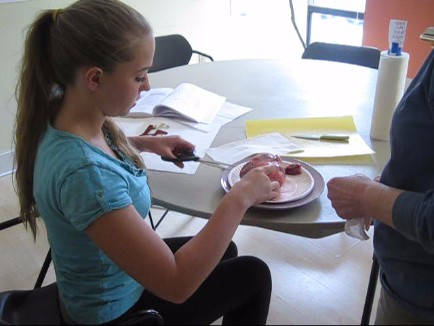by Jacob Sabourin
Our Open Doors Intern, Jacob Sabourin, has worked closely with struggling students at Aquinas College here in Grand Rapids. He is a Political Science major with a keen interest in the politics of power. Here he explores the issues of power as they relate to teens and learning.
When I was in my junior year of high school, my chemistry teacher, Mr. Stewart, asked me to come forward in front of the class. As my classmates looked on, he grabbed me by my tie (which was fairly low-hanging, admittedly), and jerked it violently up into my throat, delivering a bruising blow and choking me. “I’ve been wanting to do that all day,” he then said triumphantly, to no one in particular.

Teachers have an enormous amount of power over students. And sometimes, teachers have tempers.
None of my classmates reported the incident, and neither did I for many months. We were used to deferring to the authority of those in power over us.
But Mr. Stewart held a grudge against me because on an occasion the week before, I had not been properly deferential to his authority within the classroom. I had finished a test early and excused myself to the restroom. I had looked at him but had failed to execute the “necessary hand wave,” which, unknown to me, was a requirement to use the restroom, according to the unwritten law of the land. He told me I had to serve a week of detention under his supervision, which I refused to do, and so he failed me for the semester. The next semester, I arranged a meeting with the principal, showed him my assignments, and proved to him I had, in fact, passed the class according to public school requirements. The school district began investigating the many complaints levied against Mr. Stewart, and apparently some sort of reprimand was given.
But Mr. Stewart still teaches chemistry at my high school. I still had to serve a week of detention scrubbing floors (under the principal’s supervision, however). And even though I had incontrovertible proof, it took me months to convince my parents that my behavior was, for the most part, righteous, and not the mark of a stereotypically rebellious teenager without a cause. And only once my parents got involved did anyone in the school administration take my complaints seriously.
I know I wasn’t alone in feeling disempowered in high school. The school system, by definition, is a hierarchical institution in which administrators have the most power. Then teachers. Then parents. Then, finally, students. Of course, most of those adults in power are not entirely as corrupt as Mr. Stewart. But they almost certainly have the ability to be.

Students can feel powerless in school.
In light of this fact, it’s imperative for teenagers to understand what they do have power over. Eating right and exercising empowers their bodies. Learning a skill like a musical instrument or a new languages or a useful craft can empower a teen through practical knowledge, which will be recognized by others who may defer to her out of respect. Standing up to a bully empowers a teen to regain sovereignty over his social standing. And when a teen understands his rights and responsibilities as a citizen, he can be sure he is not a victim of the abuses of others.
Like all human beings, teenagers encounter issues involving power dynamics every day. But many teens aren’t aware of who has power over them, why that is, and what they can do to increase their own power over themselves. I wasn’t aware of these dynamics when I was in high school. I didn’t know how to have a reasonable conversation with adults without resorting out of desperation to overused and empty tropes like “this is a free country and I can do what I want.” When a teen says things like this, he sounds simple-minded and needlessly rebellious to any casually-observing adult . Often, because of teens’ limited understanding of the world around them, they have difficulty communicating a deeply entrenched sense of powerlessness, even to their parents.
Parents are prone to mistaking these communicative difficulties for behavioral problems. Perhaps a student says she “doesn’t see the point” of repeated worksheet assignments for her English class in which she answers trivial questions regarding the assigned novel (say, The Great Gatsby), which include reciting dates on which events in the book occurred, or the color of the sweater of a minor character. Suppose she fails these assignments repeatedly, and as such, is failing the class.
But she reads Gatsby and understands it. Maybe she admires a boy across the street, and can relate to the character Gatsby’s feelings of jealousy and lost love as he gazes across the bay to the green light emanating from Daisy’s house.

A teen’s true intelligence isn’t always recognized by worksheets and tests.
In this situation, a parent or teacher might force a more rigorous routine of study on this student after diagnosing her as lazy or uncommitted to her academic success. Or worse, the issue could be ignored and she could flunk out of high school.
But the real issue in this scenario is that her academic needs and talents are not addressed by these assignments. She doesn’t know she can go to her teacher and discuss these personal reflections; the unwritten rules of school tell her that the teacher’s current assignments are the only possible assessment of her learning. She feels unintelligent or worthless in class, and she’s turned off to reading. She probably doesn’t even know her reflections have academic validity. But they do!
If she did have that conversation, she might be directed to other books that might interest her, leading to more discussions. Those discussions might even change the way assignments and grading are handled in that class.
Instead, she finds school to be an oppressive environment, in which her natural ability to think critically (a capacity all humans have) is stifled. The most she can think to say, once again, is that she “doesn’t see the point” of her assignments. She might even say “reading is stupid,” or “I hate school,” or a number of discouraging statements, all stemming from an inability to communicate her powerlessness.
I joined Open Doors because I know there are teens out there who feel oppressed. They know what is best for themselves but have difficulty communicating how exactly their power is being taken from them. As a result don’t know how to empower themselves. In my short time here, I’ve seen flashes of the opportunity for youth empowerment I’d always hoped for.
This post is part of our “Your Life – Your Learning!” series, designed to help the Grand Rapids community rethink teen learning, and brought to you with support from the Wege Foundation.


















